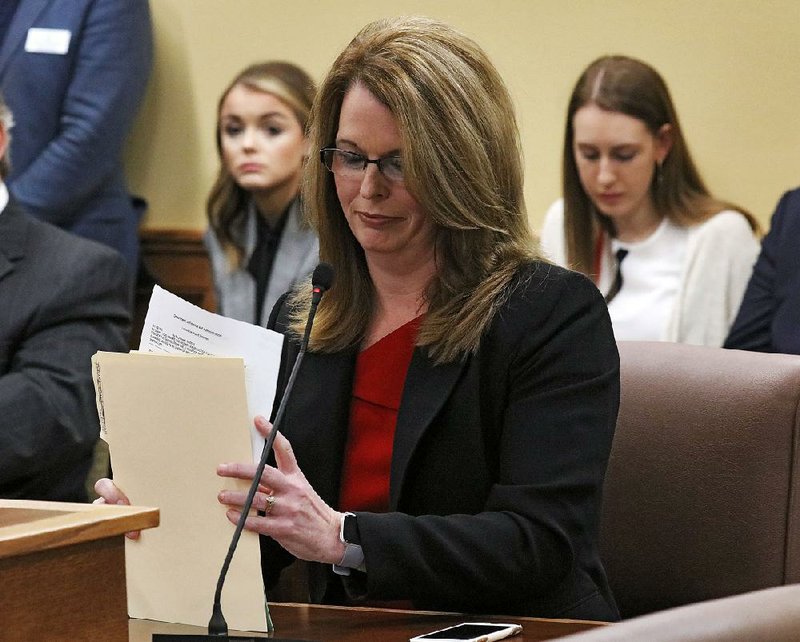A bill that would ax the individual state income tax deduction for gambling losses and use the increased revenue to reduce the developmental disabilities waiting list failed to clear the House Revenue and Taxation Committee on Tuesday.
None of the committee's 20 members made a motion to recommend House approval of House Bill 1653 by Rep. Julie Mayberry, R-Hensley, after an attorney representing Oaklawn Jockey Club testified against the bill.
Mayberry said the bill would provide $11 million a year to the Community and Employment Supports Waiver Program in the Medicaid Program Trust Fund and $500,000 a year to state general revenue for the Legislature to decide how to use it.
Based on 2017 individual income tax returns, about $244 million in gambling losses were claimed against gambling winnings in Arkansas, so the elimination of the deduction multiplied by the effective tax rate in Arkansas of 4.7 percent would raise about $11.5 million a year, said Paul Gehring, an assistant revenue commissioner for the state Department of Finance and Administration.
Gov. Asa Hutchinson's office is neutral on the bill, Gehring said.
[RELATED: Complete Democrat-Gazette coverage of the Arkansas Legislature]
Mayberry told the House tax committee that "I am presenting a bill to you that I think is a very simple choice over what are our priorities as state lawmakers.
"The priority is that we give a tax deduction to subsidize gambling habits, or is the priority to take care of children and adults with developmental disabilities who have been waiting on services for eight to 10 years, some of them."
"But I just firmly believe we should not be subsidizing' gaming habits. When I brought this up to many of you, you said, 'I had no idea we do that,'" Mayberry said.
Mayberry said other states that don't provide the tax deduction for gambling loses include Connecticut, Illinois, Indiana, Massachusetts, Michigan, West Virginia and Wisconsin.
The families that would be helped by the bill "need supportive assistance in their home, daily living skills, maybe someone to help pick them up after school and bring them home and care for them until parents get home," she said. "It might even be assistive equipment, electronics, to help them communicate. It might be a ramp to get into their house. It might be some supportive services to help them get a job, things like that people have been waiting on a list to receive those services."
Mayberry said the bill would put $11 million in state funds into the program, and those funds would be matched with $25 million in federal funds, for a total of $36 million more a year.
But Walter Ebel, who is a tax attorney for Friday, Eldredge & Clark LLP law firm and represents the Oaklawn Jockey Club, said he opposes the bill "with all due respect to the sponsors."
"I know they have a very good faith intention to support a worthy cause. I just believe this is the wrong way of supporting that cause. I believe it will not ultimately end up producing the tax revenues anticipated," he said.
The legislation is inconsistent with the way that the taxation of gambling winnings and losses has worked historically under the federal income tax law, Ebel said. "If I have gambling winnings, I can offset those gambling winnings with losses, so I would only pay tax on net gambling winnings."
Ebel said the bill would discourage people from gambling.
"It would create a record-keeping and paperwork burden on anyone who goes to the racetrack, on anyone who goes to a casino inside or outside of Arkansas. It also would affect anyone who plays the lottery," as well as golf games and poker games, he said.
Ebel said none of Arkansas' surrounding states have eliminated the income tax deduction for gambling losses, and "you would be discouraging people from participating in these activities in Arkansas and encouraging them to go to adjoining states such as Mississippi to engage in this type of activity."
Rep. Marcus Richmond, R-Harvey, asked Mayberry whether she considers the bill a tax increase.
Mayberry replied, "No."
She said "this is a form of entertainment and it is a choice that you make to do this or not.
"This is not an investment. Gambling is not a way that anybody should ever think I'm going to make money doing this," Mayberry said.
"I am sorry. I am not a gambler, but I don't see how this would be that much more of a burden. I would think it would be really hard to keep up with all those losses as well, so I don't necessarily see that this is an impact on the amount of paperwork that you have to keep up with. It's probably a lot of paperwork either way."
There were 3,137 people on the developmental disabilities waiver list as of Feb. 28, and "we were able to award more than 400 waiver slots to clients" in 2018, Marci Manley, a spokesman for the state Department of Human Services, said after the House committee meeting.
"As slots are awarded, we also receive additional applications. We also anticipate that the Provider-led Shared Savings Entity (PASSE) system will begin to affect the wait list."
A Section on 03/13/2019
